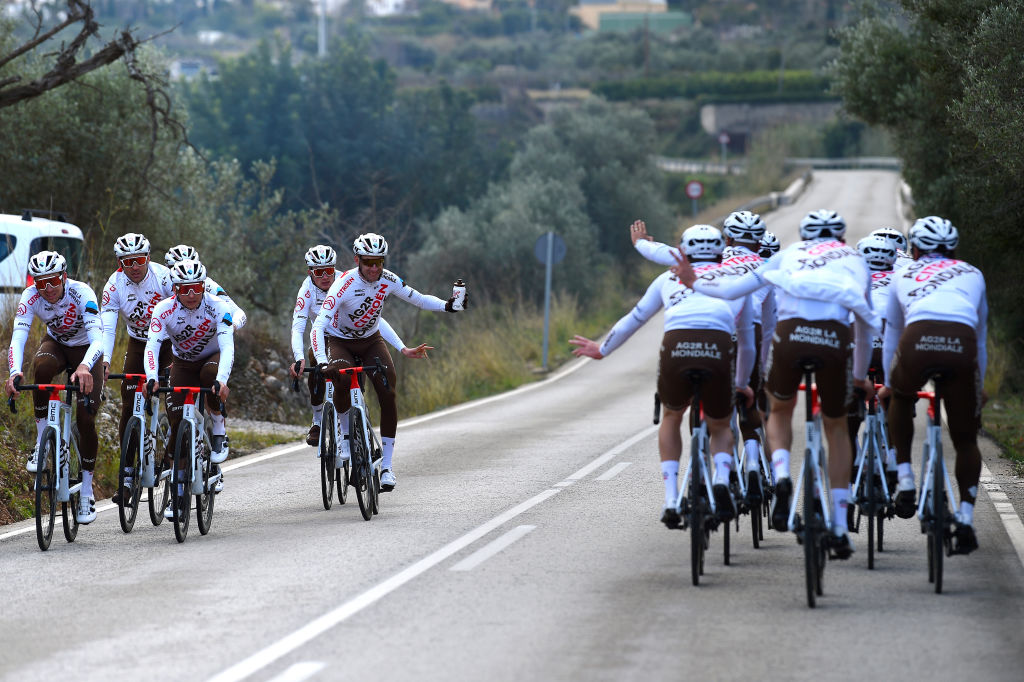Riders fear impact of training camp COVID-19 cases
AG2R Citroën and Sport Vlaanderen-Baloise also hit by cases after Jumbo-Visma end Spanish camp

Most of the biggest men’s and women’s pro teams are currently in Spain at their January training camps but cases of COVID-19 are disrupting their training camps, with fears of disrupting vital blocks of preparation and even their early-season racing plans.
On Wednesday, Jumbo-Visma quickly closed down its training camp near Alicante after it emerged a member of the team had tested positive in a daily rapid test.
"The doomsday scenario has come true," Jumbo-Visma performance manager Mathieu Heijboer said.
On Thursday, Sport Vlaanderen-Baloise discovered COVID-19 cases at their camp on the Costa Blanca after five riders and directeur sportif Walter Planckaert tested positive according to reports in the Belgian media. They have all travelled home to Belgium together by car, while the rest of the team break into pairs and eat and train separately.
The AG2R Citroën team was also hit by four cases among staff on Wednesday but they decided to continue their training camp near Alicante. Riders are training in small groups and are obliged to wear FFP2 masks except when training or eating.
There are unconfirmed reports of other teams hit by positive cases, while others managed to identify cases before teams travelled to camps. Ineos Grenadiers were due to share a hotel with another team near Alicante for their January camp but opted to return to Mallorca and stay in small groups to limit the risk of contagion.
Peter Sagan and his brother Juraj tested positive for as second time last week and was unable to join his new TotalEnergies in Spain.
Get The Leadout Newsletter
The latest race content, interviews, features, reviews and expert buying guides, direct to your inbox!
At the Jumbo-Visma hotel, the infected person and close contacts were quarantined, while Steven Kruijswijk and Primož Roglič travelled home to Monaco by car and Robert Gesink, Sepp Kuss and Tobias Foss left immediately to return to Andorra, to continue their training at home.
Ten riders, including Wout van Aert opted to stay in Spain, rather than train in the cold Belgian weather but they rode 500 metres apart in training according to Het Laatste Nieuws, with minimal team support, very limited contacts and daily testing.
Riders and teams are concerned about the impact catching COVID-19 can have on their 2022 season. Riders cannot train outdoors while positive and there are concerns about the physical damage COVID-19 can do to elite athletes’ heart and lungs.
One WorldTour team told Cyclingnews that their medical staff prefer to limit training for at least 20 days to help recovery and avoid the risk of long-term physiological damage. The UCI has still to publish its 2022 medical protocol but in the past riders had to undergo a series of check-ups and test before being allowed to race.
The Tour Down Under and the Vuelta a San Juan have already been cancelled, with teams fearing other early-season races may be lost due to the impact of the omnicron wave.
Riders are aware that a long break from training due to COVID-19 can wreck their early-season campaigns.
“If you get infected here, you are no longer on plan A. And then you will also get a bit of a mental blow, I'm afraid," Oliver Naesen told the Flemish media from the AG2R Citroën camp, with interviews done outdoors and with journalists wearing masks.
“If you have a case in the next two weeks, then that’s a small disaster. If the camp is interrupted, it’ll create a gap in your preparation for the Classics and you will no longer be able to close that at home in Belgium.”
Teammate Greg Van Avermaet revealed that he caught COVID-19 in November as he was about to return to training and isolated at home for 10 days. The former Olympic champion is convinced his second COVID-19 vaccination affected his perfomances in the second half of the 2021 season and he has put off his third booster vaccine until after the Classics.
"I think you have to time the jab very well. I didn't do that last time and I don't want to make the same mistake," he said.

Stephen is one of the most experienced member of the Cyclingnews team, having reported on professional cycling since 1994. He has been Head of News at Cyclingnews since 2022, before which he held the position of European editor since 2012 and previously worked for Reuters, Shift Active Media, and CyclingWeekly, among other publications.